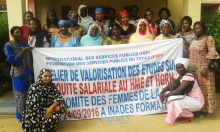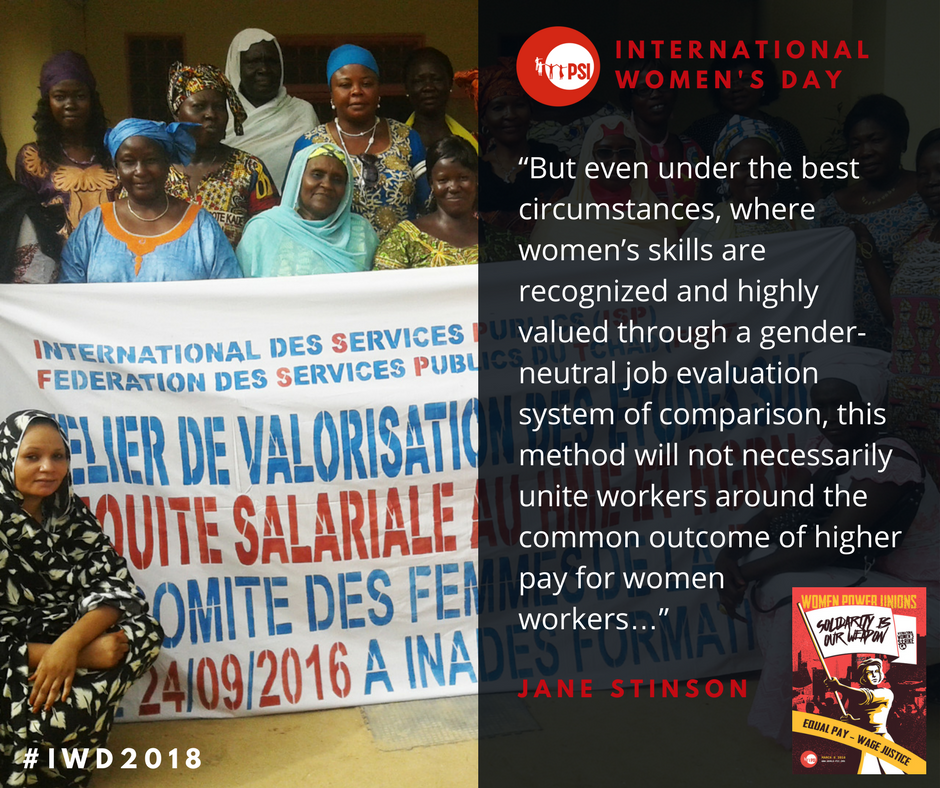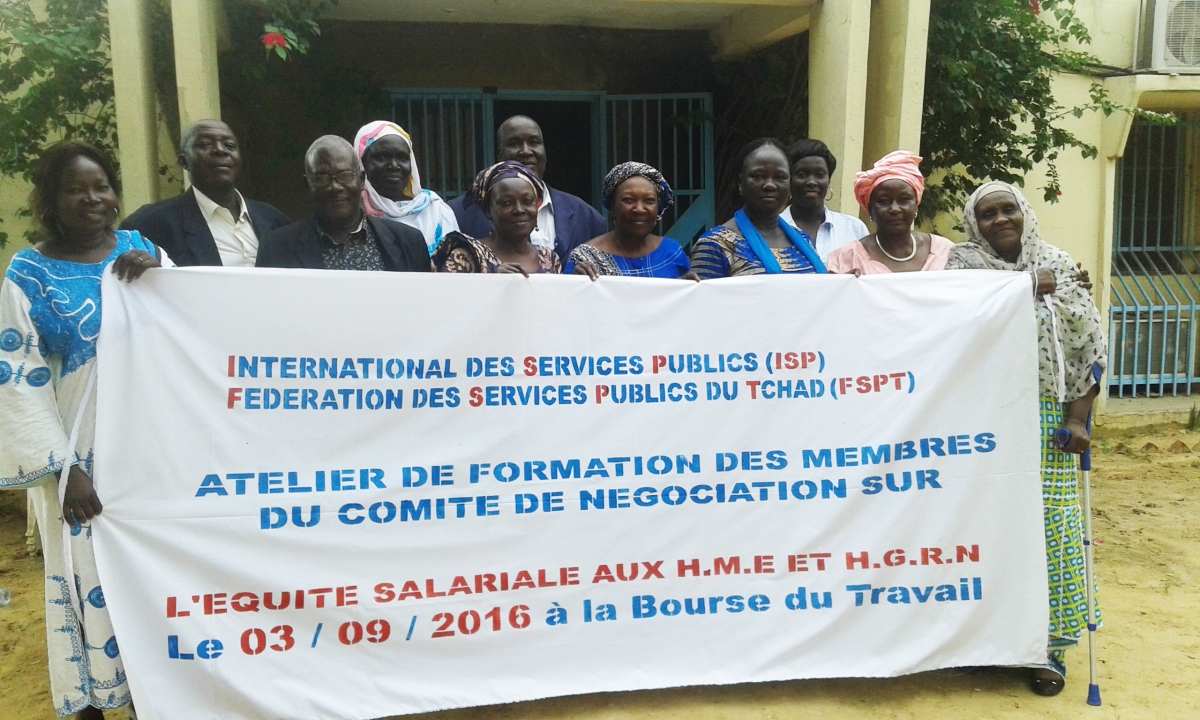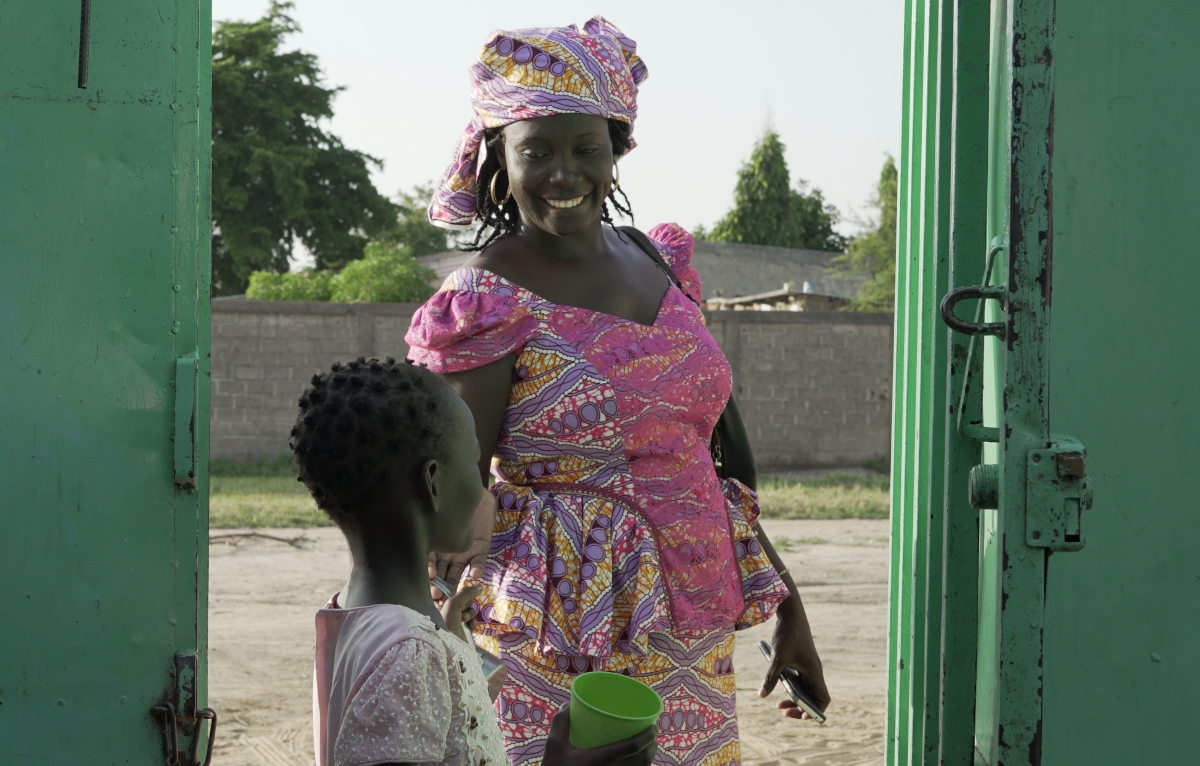"Pay equity" project in Chad


Check out PSI's online campaign for International Women's Day
(1st - 10th March 2018)
"PAY EQUITY" PROJECT IN CHAD
This project is part of a larger project launched in 1995 by PSI, in collaboration with ST-Sweden, in Francophone Africa. The project recognizes the gender-based differences in the working conditions and salaries of working women, and shows that the work done by most women in the world is paid less than that done by most men. It goes beyond the basic concept of "equal pay for equal work", which is widely accepted in national legislation. It seeks to eliminate gender stereotypes and introduce the concept of "equal pay for work of equal value".
In Chad, a first survey was conducted in 2010 at the Hôpital Général de Référence Nationale of N'Djamena and a further study was carried out between 2014 and 2015 at the Hôpital de la Mère et de l’Enfant .
 The survey and the study highlighted the difficulties women workers face to ensure basic steps towards greater equality in the division of labour, access to training and information, distribution of wealth and resources, participation in decision-making and the exercise of power. They noted that women were under-represented in management and decision-making bodies, a situation that is reflected in the country’s socio-cultural and psycho-social environment in which women have had limited access to good education, training and information. This, in turn, has had an adverse effect on the value of women’s jobs.
The survey and the study highlighted the difficulties women workers face to ensure basic steps towards greater equality in the division of labour, access to training and information, distribution of wealth and resources, participation in decision-making and the exercise of power. They noted that women were under-represented in management and decision-making bodies, a situation that is reflected in the country’s socio-cultural and psycho-social environment in which women have had limited access to good education, training and information. This, in turn, has had an adverse effect on the value of women’s jobs.
The initial results of the survey and study were brought to the attention of the workers and the managers of the two hospitals, and this boosted their commitment to promote the value of women’s jobs.
The project has allowed an introduction to the basic notions of pay equity, an understanding of the difference between the wages of men and women, a strong mobilization of women in the unions and women’s unionisation, self-awareness by women of their situation, revitalization of women's committees, and the awareness of hospital administrators and a commitment to collaborate to reduce the gap between the salaries of men and women. In the long term, it is expected that this will allow a better evaluation of the workstations and fairer remuneration for the women workers.
Interview with Demba Karyom, young jurist and young union leader

Demba Karyom remembers it as though it were yesterday. She was eight years old when, one evening, she intervened in a quarrel between her father and her mother. “I couldn’t bear to see him shouting at her any longer. I told him that I would be a judge when I grew up and send him to prison. My father’s jaw dropped and, from that day on, he stopped harassing my mother”, she says proudly. Demba now works at the higher level court in Ndjamena, something she dreamed about. But not as a judge. “I realised that I did not want to sit in judgment over others, especially in this corrupt environment. I wanted to listen to them. That is why I became a court clerk, and also a trade unionist”, she explains. She is now 33 and president of the women’s committee in her national trade union
By standing up to her father, she affirmed her rejection of the patriarchal system and her attachment to what she would later know as feminism. “My mother had six children, all girls, and everybody made fun of her because of that. However, I have succeeded, while many men in our family are incompetent”, she remembers. Demba encountered discrimination in the judiciary. In theory, in the civil service, the rule is equal pay for those with the same qualifications. But no woman has been appointed to a position of responsibility and they therefore have none of the benefits that derive from that. Although it is theoretically possible to apply for supplementary training, which would accelerate career progress, women are ignored. Men have the right to the best opportunities, to a ridiculous extent: “they have the best chairs in the office, they leave the broken ones to us, I have to make them change places!”, she recalls, laughing.
Changing the mentality is not simple, even among women. “They are often reluctant to join in when we take action. They say they have got jobs to do at home. They find it difficult to break free from stereotyping. But when they realise how unjust things are, they are the most dynamic”, says Demba. On 6 December 2016, many women joined in protests against delays in the payment of wages to civil service employees. They brandished placards carrying the following messages: “women want to give birth in good conditions”, “the children are hungry”. At the crack of dawn, heavily armed gendarmes and national guard officers blocked this women’s march, indicating the concern it caused the government.
In order to encourage women and girls to demand their rights, Demba has only one motto: positive discrimination. If a trip is organised, women should be prioritised. The same for training sessions and workshops. She also has a secret: find a role model in the union and share her doubts, questions and concerns with her. In her case, this is Ndoukoulgone Rachelle, vice-president of the social and health workers’ union, the Syndicat des Travailleurs de l'Action Sociale et de la Santé (SYNTAS). Demba consults her every time she gets the feeling she has hit a barrier, including on personal issues. How does she manage to reconcile work with family life and make her husband understand her involvement in the union? “It is such a macho environment that our husbands are convinced we go there to try and get picked up. But she encourages me to do what I want to do”, she says. She is proud at what Rachelle has achieved and her participation in national collective bargaining. “She showed me the way, she is my Mandela”, she concludes, laughing.
The question of the role of women is related to the unions’ organisational problems. Demba says there are workshops for women and others for young people, but she regrets “the chaos and lack of visibility: our partners don't know what we organise and vice-versa, this wastes a lot of energy”. This weakness is a product of the difficulties unions have in maintaining regular activities and evaluating them. It is also the result of trade unions’ limited resources. The PSI has campaigned for the introduction of the check off system, which was previously unknown to most members. Most unions are now in favour of this system, but the government is refusing to introduce it.
Faced with a deep economic crisis, partly caused by falling oil prices, the authorities halved the benefits of civil service workers. “We pay to clean up the mess caused by the government’s bad management. It is unacceptable, our wages are already pathetic”, Demba complains. While the government is planning further cuts, the unions are organising more demonstrations to demand more transparency. “They have robbed us of our benefits. What have they done with our money? What have they invested it in?”, she says.
However, calling for strike action has become increasingly difficult. The authorities have reduced the maximum length of legal strikes to three days. The only way to stand up to the government is to remain united, which the PSI encourages. Demba remembers that in 2015, when an awareness raising campaign was organised to prevent the re-election of President Idriss Déby, six trade unionists were thrown in prison, including Younous Mahadjir, the PSI’s representative in Chad. “We all took action, with other civil society organisations, political parties and the PSI to attack government policy. The authorities were forced to release us because they know that together we are strong enough to block everything”, she said. The joint action increased the credibility of the unions in the eyes of the government, she says. “They respect us more when they see that the PSI is on our side and that changes the balance of forces”, she concludes.
Demba was invited to the most recent PSI Congress and goes all starry-eyed when she talks about it. “I returned with my address book full and I met some wonderful people. I saw that many others were experiencing the same things that I see going on in my country. Sometimes the situation is even more dramatic. That strengthened my commitment to my union, my people and my family”, she says. She is proud that her eight-year old daughter is as determined as she is, but hopes to leave her a fairer world. Meanwhile, Demba has already won one victory: “last year, I was in Abidjan for a work meeting when I was invited to participate in a debate on the RFI radio station. My father was with my daughter and he called her over so she could listen to me and be proud of me”, she says. He has never forgotten that time, a quarter of a century ago, when his eight-year old daughter told him to stop shouting at his wife.
More information:
- Demba Karyom interview - In English
- Demba Karyom interview - In French
- Evaluation Report of the Pay Equity Project - In French

